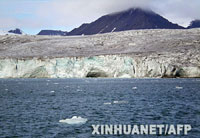 Global warming increases the rate of "ocean acidification" and is damaging some of the most important living organisms in the sea' + char(39)+ N's food web,
Global warming increases the rate of "ocean acidification" and is damaging some of the most important living organisms in the sea' + char(39)+ N's food web,
Global warming increases the rate of "ocean acidification" and is damaging some of the most important living organisms in the sea' + char(39)+ N's food web,
The world' + char(39)+ N's oceans now absorb millions of tons of the global warming gas each year, and thus help to slow the pace of climate change, but the benefit is far outweighed by extreme and damaging changes in the water' + char(39)+ N's chemistry due to global warming, according to two studies published in the journal Science available here on Friday.
"While the changes are alarming, it' + char(39)+ N's nearly impossible to predict how this unprecedented acidification will affect entire ecosystems," said Ken Caldeira, an atmospheric scientist with the Carnegie Institute' + char(39)+ N's Department of Global Ecology at Stanford.
Caldeira and his colleagues raised the issue in the July issue of Science.
Only two weeks ago in the same journal, Richard Feely, a chemical oceanographer in
Feely' + char(39)+ N's study warned that if greenhouse gas emissions continue uncontrolled, the world' + char(39)+ N's oceans in this century will become 150 percent more acidic than they are today.
Feely' + char(39)+ N's report showed that ocean waters welling up from the depths along the Pacific Coast from Canada to Mexico are threatening a wide variety of marine organisms as carbon dioxide, the major greenhouse gas, saturates the water and increases its corrosive acidity.
Each spring along the West Coast, winds from the northwest blow strongly across the sea surface toward the shore and generate strong upwelling currents, Feely explained. The upwelling, in turn, brings water saturated with carbon dioxide from the deep bottom toward the surface.
Then, as the gas mixes with seawater, it becomes carbonic acid, and when that acidity of the water becomes strong enough, it can dissolve the calcium carbonate shells of many of the sea' + char(39)+ N's most important animals.
The acid can endanger all kinds of marine animals, from the shells of microscopic plankton to the beaks of giant squid.
Scientists have already reported the severe damage that acidity in seawater is causing to corals -- both the shallow coral reefs of the tropics and the lesser-known deepwater corals of the northern oceans that also require calcium carbonate to build their bony skeletal homes.
But mussels, oysters, crabs, urchins, squid, and the kind of microscopic carbonate-shelled plankton that form the diet of creatures ranging in size from krill to whales are also organisms that can fall prey to increases in the ocean' + char(39)+ N's acidity, according to Feely' + char(39)+ N's study.

 Previous page
Previous page Back to top
Back to top







